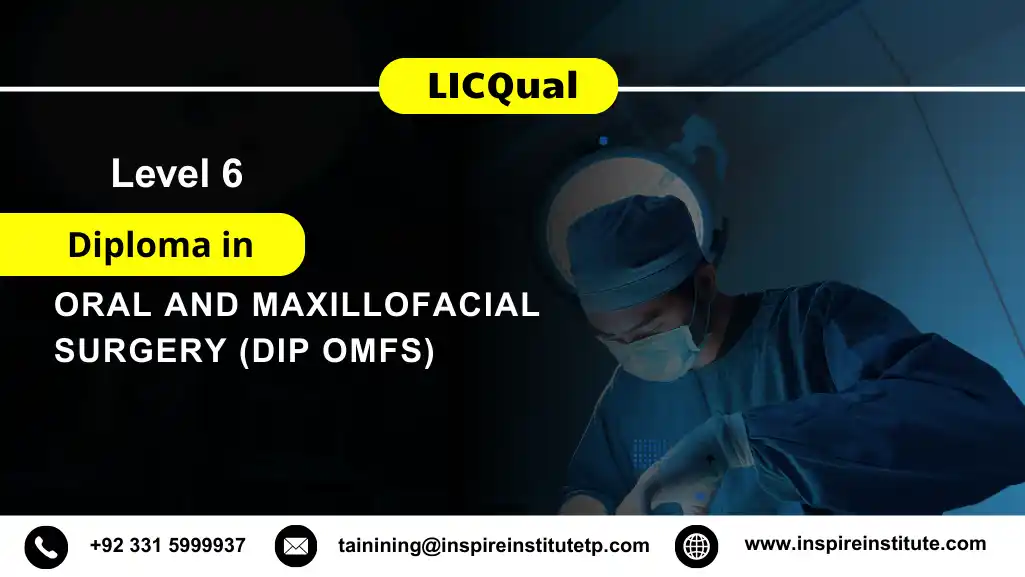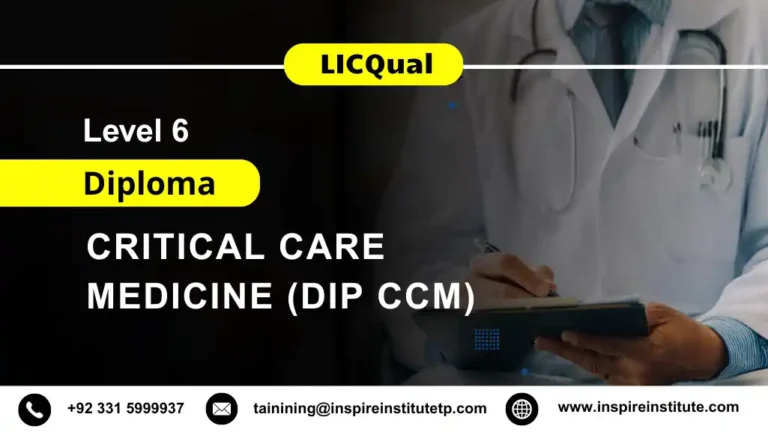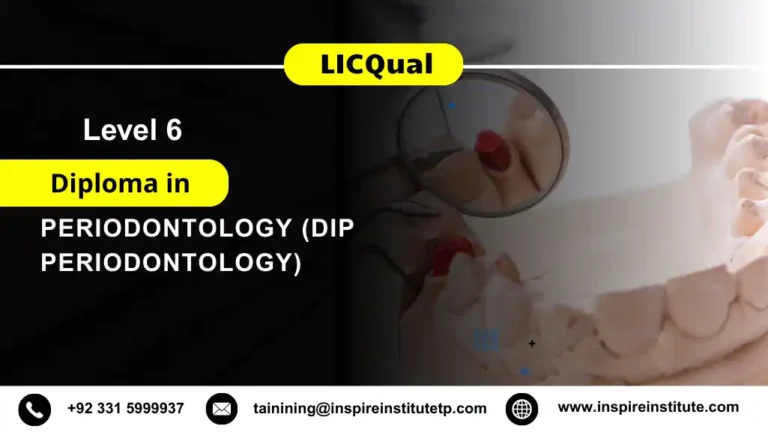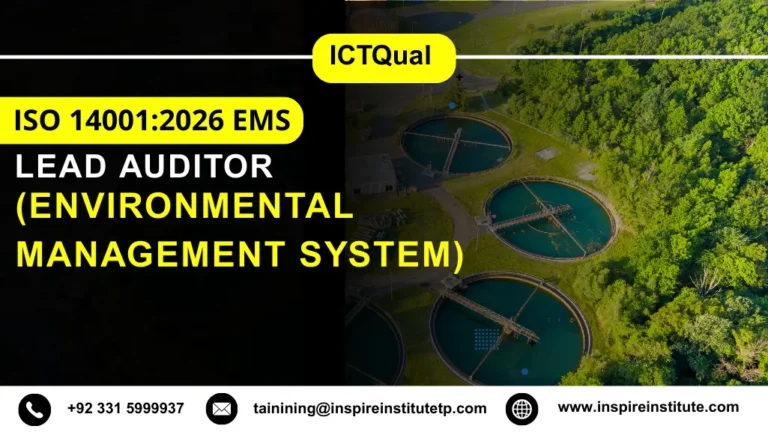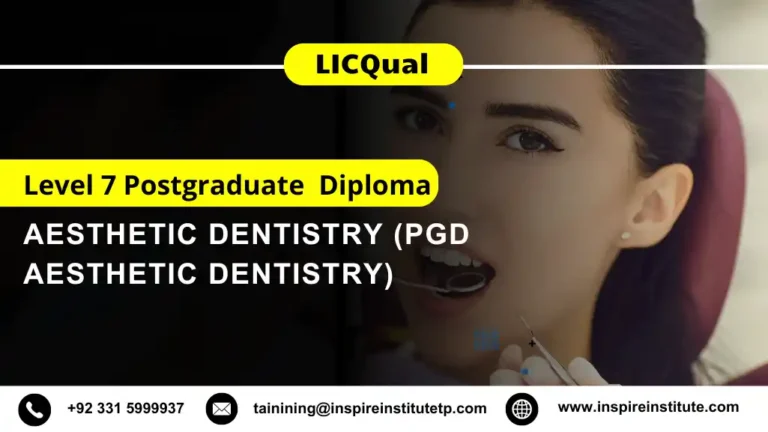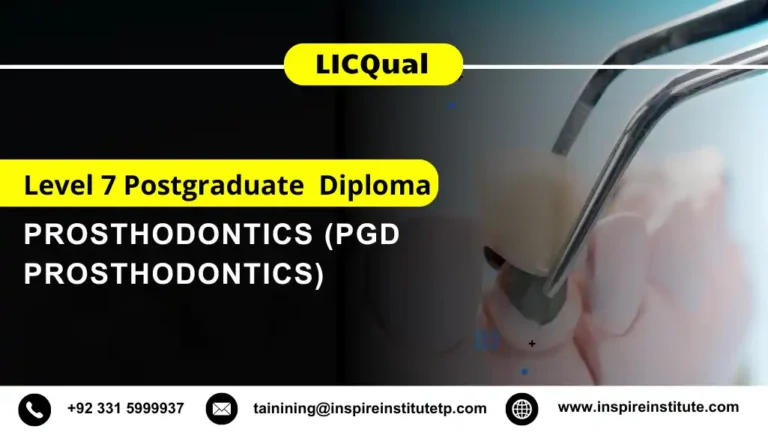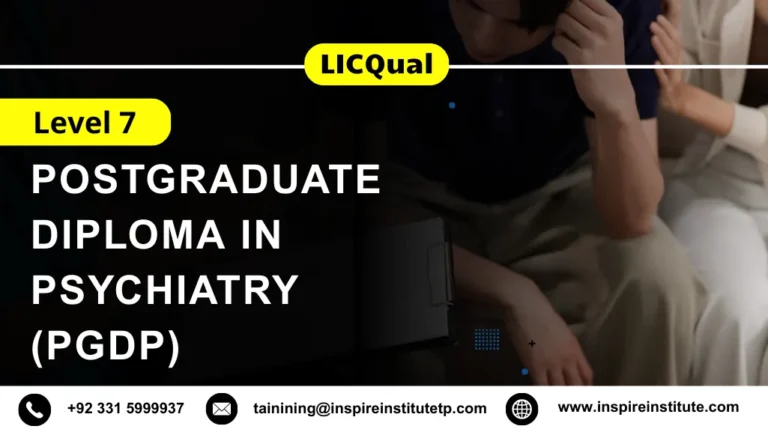LICQual Level 6 Diploma in Oral and Maxillofacial Surgery (Dip OMFS)
The LICQual Level 6 Diploma in Oral and Maxillofacial Surgery (Dip OMFS) is a UK-accredited qualification designed for dental and healthcare professionals seeking advanced knowledge and practical skills in oral and maxillofacial surgery. This diploma provides a comprehensive understanding of surgical principles, facial anatomy, trauma management, reconstructive procedures, and patient care, combining theoretical knowledge with practical insights. It is ideal for dental surgeons, maxillofacial trainees, and early-career specialists looking to enhance their surgical expertise through a flexible, assignment-based programme.
This course is suitable for dental surgeons who want to expand their skills in managing complex oral and facial conditions. Participants will gain confidence in performing surgical interventions, treating facial trauma, and executing reconstructive procedures with precision. The programme supports practitioners in delivering higher-quality patient care while developing advanced technical competence.
Oral and maxillofacial trainees will benefit from this diploma by strengthening their clinical decision-making and surgical knowledge. It provides the necessary foundation to perform complex procedures safely and effectively, preparing learners for advanced roles in hospitals, clinics, and specialised surgical centres. The course also emphasises interdisciplinary collaboration and best practices in patient management.
Dental assistants and support staff involved in surgical procedures will gain valuable insights into the workflow of oral and maxillofacial surgery. The programme helps them understand surgical protocols, optimise chairside assistance, and support patient safety and post-operative care, enhancing the efficiency of clinical teams.
Key benefits of the course include specialist knowledge of surgical anatomy, procedural techniques, and evidence-based patient management. Learners also develop practical skills to assist or perform complex surgical interventions, improving treatment outcomes. The UK-accredited diploma enhances professional credibility, supports career progression, and provides a pathway to higher surgical qualifications.
The LICQual Level 6 Diploma in Oral and Maxillofacial Surgery equips dental professionals with advanced theoretical knowledge, practical competence, and professional recognition. It is a valuable step for those aiming to excel in oral surgery, enhance patient care, and progress within the specialised field of maxillofacial and dental surgery.
Why Choose this Qualification
The LICQual Level 6 Diploma in Oral and Maxillofacial Surgery (Dip OMFS) is designed for dental and healthcare professionals seeking advanced knowledge and specialised skills in the diagnosis, management, and surgical treatment of complex oral and maxillofacial conditions. This UK-accredited qualification provides comprehensive theoretical understanding and practical application to support professional competence in clinical, surgical, and hospital-based settings. It is ideal for dentists, maxillofacial surgeons, dental specialists, and early-career practitioners aiming to expand their expertise through a flexible, assignment-based programme.
Key Reasons to Choose this Qualification:
Specialist Knowledge: Gain an in-depth understanding of oral and maxillofacial anatomy, pathology, surgical techniques, and patient management protocols. This knowledge ensures safe, effective, and evidence-based surgical practice.
Practical Application: Develop confidence in performing advanced procedures, including extractions, reconstructive surgeries, trauma management, and corrective interventions, improving surgical precision and patient outcomes.
UK-Accredited Diploma: Earn a recognised qualification that strengthens professional credibility and opens career opportunities in dental hospitals, clinics, and specialised maxillofacial units. Accreditation ensures alignment with UK and international professional standards.
Flexible Learning: Benefit from a structured, assignment-based format that allows learners to study at their own pace while balancing clinical practice and professional responsibilities, making it suitable for busy practitioners.
Evidence-Based Training: Learn contemporary surgical techniques and patient care strategies based on the latest research, clinical guidelines, and best practices to ensure safe and effective outcomes.
Career Development: Open pathways to roles such as Oral and Maxillofacial Surgeon, Hospital Dental Practitioner, or further advanced studies in surgical dentistry and maxillofacial specialisations.
Enhanced Patient Care: Improve surgical outcomes and patient safety by applying advanced techniques with precision and evidence-based strategies. This diploma equips professionals to deliver high-quality, patient-centred care.
Professional Development: Strengthen clinical decision-making, surgical expertise, and interdisciplinary collaboration skills, enhancing effectiveness within surgical teams and preparing for leadership roles in oral and maxillofacial practice.
The LICQual Level 6 Diploma in Oral and Maxillofacial Surgery equips professionals with advanced surgical knowledge, practical competence, and a UK-recognised qualification, enabling them to excel in complex oral healthcare, advance their careers, and improve patient outcomes.
Course Overview
LICQual UK Awarding Body
Average Completion Time:
6-24 Months
Study Units: 6 Units
Evidence & Assignment Based
Mandatory Units
Who Should Take This Course
The LICQual Level 6 Diploma in Oral and Maxillofacial Surgery (Dip OMFS) is designed for dental and healthcare professionals who wish to gain specialist knowledge in the safe, effective, and advanced practice of oral and maxillofacial surgical procedures. This UK-accredited qualification is ideal for practitioners aiming to enhance their surgical competence, expand treatment options, and progress within the field of complex dental and facial healthcare. It equips learners with essential theoretical insights and practical skills to improve patient outcomes, enhance clinical confidence, and support professional growth in hospital and clinical settings.
This course is suitable for:
Oral and Maxillofacial Surgeons: Practitioners seeking to deepen their expertise in complex surgical procedures, including trauma management, reconstructive surgery, and corrective interventions.
Dental Surgeons: Professionals wishing to broaden their clinical skills to include advanced oral surgery techniques, patient management, and surgical planning.
Dental Nurses and Clinical Support Staff: Individuals aiming to develop knowledge of surgical protocols and patient care strategies to provide effective support during oral and maxillofacial procedures.
General Dentists: Dentists who want to enhance their understanding of surgical anatomy, pathology, and techniques to deliver comprehensive care in clinical settings.
Aspiring Surgical Professionals: Learners preparing for higher-level qualifications or specialist training who wish to build a strong foundation in advanced surgical dentistry and maxillofacial care.
Healthcare-Oriented Learners: Those interested in the principles of oral and maxillofacial surgery, including pre- and post-operative management, patient safety, and interdisciplinary collaboration.
The LICQual Level 6 Diploma in Oral and Maxillofacial Surgery is particularly valuable for dental professionals seeking to advance their technical surgical expertise, gain a UK-accredited qualification, and contribute effectively to high-quality, patient-centred surgical care. It supports career progression, enhances professional recognition, and prepares learners for leadership roles in complex oral healthcare.
Course Benefits
The LICQual Level 6 Diploma in Oral and Maxillofacial Surgery (Dip OMFS) provides significant benefits for dental and healthcare professionals seeking to develop advanced expertise in oral and maxillofacial surgical practice. By combining in-depth theoretical knowledge with practical application, this diploma equips learners to perform complex surgical procedures safely, enhance precision, and improve patient care across a variety of oral and facial interventions. Delivered through a flexible, assignment-based programme, it upholds high professional and clinical standards to support career advancement and improved surgical outcomes.
Key Benefits of the Course:
- Specialist Knowledge: Gain a comprehensive understanding of oral and maxillofacial surgery, including surgical anatomy, trauma management, reconstructive techniques, and advanced treatment planning for complex cases.
- Practical Application: Develop competence in performing surgical procedures safely and effectively, from extractions and corrective surgeries to facial reconstructions, ensuring improved clinical outcomes and patient satisfaction.
- Recognised Qualification: Earn a UK-accredited diploma that enhances professional credibility and career opportunities in hospitals, dental clinics, surgical practices, and academic environments.
- Flexible Learning Pathway: Benefit from an assignment-based structure that allows learners to progress at their own pace, balancing clinical duties with advanced study and professional development.
- Evidence-Based Training: Learn modern approaches to oral and maxillofacial surgery grounded in the latest research, clinical protocols, and international best practices, ensuring safe, effective, and patient-centred care.
- Career Development: Open pathways to roles such as Maxillofacial Surgery Specialist, Clinical Practitioner, or advanced studies in surgical dentistry and hospital-based care, strengthening career progression and leadership potential.
- Enhanced Patient Care: Deliver high-quality surgical interventions with improved precision, safety, and patient comfort. Applying advanced surgical knowledge allows professionals to contribute to better functional and aesthetic outcomes, fostering trust and satisfaction.
- Professional Growth: Strengthen technical expertise, critical decision-making, and surgical problem-solving skills, enabling effective collaboration within multidisciplinary healthcare teams and supporting leadership in advanced oral and maxillofacial practice.
The LICQual Level 6 Diploma in Oral and Maxillofacial Surgery equips professionals with advanced theoretical knowledge, practical surgical skills, and a UK-recognised qualification, empowering them to excel in complex clinical practice, advance their careers, and deliver superior patient care.
Eligibility Criteria
The LICQual Level 6 Diploma in Oral and Maxillofacial Surgery (Dip OMFS) is designed for dental and healthcare professionals seeking to advance their expertise in complex oral and maxillofacial surgical practice. This UK-accredited qualification is ideal for dentists, surgical trainees, and allied healthcare professionals who want to gain in-depth knowledge of surgical anatomy, advanced procedures, and patient-centred care. The programme combines theoretical understanding with practical application, equipping learners with the skills required to perform complex interventions safely, manage surgical complications, and enhance patient outcomes. Its flexible, assignment-based format allows professionals to balance work commitments while progressing their careers in oral and maxillofacial surgery.
Educational Background:
Applicants should hold a recognised dental or medical qualification, such as a Bachelor’s degree in Dentistry (BDS) or Medicine (MBBS), or an equivalent internationally recognised qualification.
Professional Experience:
A minimum of 2–3 years of clinical experience in dentistry or surgical practice is highly recommended to ensure learners can apply theoretical knowledge effectively in practical settings.
Age Requirement:
Learners must be at least 18 years old at the time of enrolment to ensure readiness for professional study and clinical application.
Language Proficiency:
Proficiency in English is essential for understanding course materials, completing assignments, and participating in professional communication. Applicants whose first language is not English may be required to provide evidence of English proficiency, such as IELTS (minimum 6.5) or equivalent.
Technical Requirements:
Applicants should demonstrate competence in fundamental dental and surgical procedures, familiarity with clinical protocols, and the ability to handle surgical instruments safely. Experience with diagnostic tools and treatment planning software is advantageous.
Required Documents:
Submission of a valid ID or passport and proof of educational qualifications is necessary for registration.
The Qualification Process
LICQual Level 6 Diploma in Oral and Maxillofacial Surgery (Dip OMFS) follows a structured pathway to ensure learners gain comprehensive knowledge, practical skills, and professional competence in community oral healthcare.
Step 1: Self-Assessment
Learners review the entry requirements to confirm eligibility. Candidates with a background in dentistry, oral health, or public health are encouraged to apply.
Step 2: Registration
Complete the registration process by submitting required documents such as proof of qualifications, a valid ID, and payment of enrollment fees.
Step 3: Induction
An induction session is conducted to:
- Verify learner eligibility and documentation.
- Introduce study materials, learning outcomes, and assessment procedures.
Step 4: Learning and Evidence Submission
Learners complete assignments, case studies, and practical exercises demonstrating competence in public health dentistry, community oral health assessment, preventive strategies, and program planning.
Step 5: Feedback and Revision
Assessors review submitted evidence and provide constructive feedback. Learners can revise and resubmit work to meet all required standards.
Step 6: Competence Validation
Final submissions are evaluated to confirm that learners have met all theoretical and practical learning outcomes.
Step 7: Internal Quality Assurance (IQA)
The IQA team reviews the assessment process to ensure accuracy, fairness, and compliance with international standards.
Step 8: External Verification (EQA)
External verifiers validate the authenticity and quality of learner achievements.
Step 9: Certification
Upon successful verification, learners are awarded LICQual Level 6 Diploma in Oral and Maxillofacial Surgery (Dip OMFS) , demonstrating advanced proficiency in community oral healthcare and preparing them for professional growth in dental public health, preventive dentistry, and healthcare policy.

